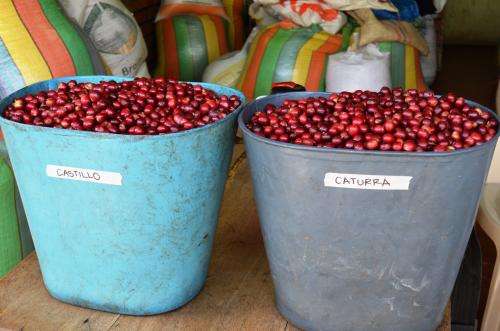'Sensory trial' will provide vital info for entire coffee supply chain

World Coffee Research and Catholic Relief Services are partnering to find out if a coffee variety bred for performance can match a natural variety in aroma, fragrance and taste.
World Coffee Research is an industry supported program of the Norman Borlaug Institute of International Agriculture at Texas A&M University in College Station. Catholic Relief Services is the official international humanitarian agency of the Catholic community in the U.S.
Small-scale coffee farmers in Colombia and across the world are making decisions today that will affect their families' fortunes for decades to come," said Michael Sheridan, Catholic Relief Services coffee adviser coordinating in-country research in Colombia. "Initiatives like the Colombia Sensory Trial will help them make those decisions on the basis of better information."
Through the Colombia Sensory Trial, two leading Colombian coffee varieties, caturra and castillo, will be subjected to analysis to garner information that can be used to benefit each link in the coffee supply chain from farm to cup.
Caturra is a natural variation of the Bourbon coffee variety that is well-regarded for taste and smell, but is susceptible to diseases, particularly coffee leaf rust. Castillo is a hybrid developed by the Colombian coffee research institute Cenicafé to maximize yields, disease resistance and cup quality.
Participants said the sensory trial's independent analysis will provide all those along the coffee supply chain with information needed to choose a variety to plant, promote and buy. These will include providing growers with information on expected outcomes and returns when selecting a coffee variety for their farms, helping coffee buyers find coffees that will meet their customers' criteria, and giving policymakers real data for making decisions on what varieties to promote, support and subsidize with public resources.
In terms of coffee quality and productivity, scientific evaluations will help thousands of farmers make the best business decision on variety selection, they said, and the sampling design will ensure maximum validity and robustness.
Dr. Timothy Schilling of World Coffee Research said the work represents a rare opportunity to compare the performance of two varieties growing side by side at over 25 farms.
"For the first time we'll be able to study the effect of key environmental factors like altitude, soil type, shade, etc. on quality attributes and examine the effect that variety plays within and among all the different environments," Schilling said. "The robust statistical design will give us great discriminatory power, something that is usually missing in this kind of work."
According to Schilling, Catholic Relief Services will collect samples from dozens of farms where the two varieties are currently being grown side by side. This process eliminates differences in environmental, agronomic and processing variables, thereby isolating the impact of genetic material on cup quality. Participating farms have been divided into three elevation strata, allowing researchers to better understand the interactions between genetics and elevation—a key determinant of coffee quality.
After harvesting, the sensory evaluation process will take place with two controlled cupping panels consisting of coffee cuppers recruited from leading specialty coffee companies, including Counter Culture Coffee, George Howell Coffee, Intelligentsia Coffee, Keurig Green Mountain, Red Fox Coffee Merchants, Starbucks and Stumptown Coffee. These professionals will taste the coffees in a blind cupping.
Following the cupping events, laboratory-based sensory tests will be performed at the sensory lab of Kansas State University, trial coordinators said. Catholic Relief Services and the International Center for Tropical Agriculture will collaborate to conduct socio-economic analyses of the sensory findings. The results will be published in 2015.
Provided by Texas A&M University





















